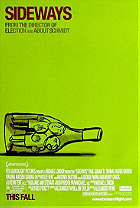
Posted : 17 years, 5 months ago on 2 January 2008 10:26
(A review of
Sideways)
I like how wine continues to evolve, like if I opened a bottle of wine today it would taste different than if I'd opened it on any other day, because a bottle of wine is actually alive. And it's constantly evolving and gaining complexity. That is, until it peaks, like your '61. And then it begins its steady, inevitable decline - Maya
/spoilers/ A bitter-sweet comedy about life's disappointments, the film centers around the journey of a downtrodden writer/high school Egnlish teacher/wine connoisseur Miles (Paul Giamatti) and his washed-up actor friend Jack (Thomas Haden Church) to the famous wine country where they meet the women of their dreams (Virginia Madsen, Sandra Oh), sort of. Although the two characters have completely different personalities (one is very serious about everything while the other takes nothing seriously), both are at the crossroads of life as Miles frets over probably his only and last chance to get published and Jack over his last days as a bachelor. The portrayal of two middle-aged men who have accomplished next to nothing thus far in their lives are painfully true to life; yet the movie does not get bogged down in the melodramatics. The sadness and disappointments are mixed with tons of humour and a soupçon of irony. The charm of the movie is that it brings together the grotesque human comedies with the tragic and serious aspects of life, mixes them up and serves up a bitter-sweet dish of what life is all about.
The movie is very entertaining (even if Jack's antics can get tiring after a while), and the acting is superb. Although depressing at times, the movie is not pessimistic. The undercurrent of sadness runs through the movie but never overcomes it. For the resignation of Jack to a married life and a job in his father-in-law's business, there is the continuous strife of Miles who, one gets the sense by the end of the film, will keep on trying. Life is therefore like Miles's favourite wine Pinot, only "somebody who really takes the time to understand [its] potential can then coax it into its fullest expression."
For those who don't give up, there is hope yet.

0 comments,
Reply to this entry
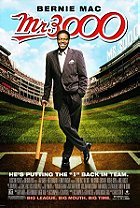
Posted : 17 years, 5 months ago on 2 January 2008 10:20
(A review of
Mr. 3000)
This movie has the honour of getting the first 1-star rating from me this year. Yes, avoid it at all costs. It is a terrible movie with no soul and no heart. Supposedly a comedy, it's surprisingly humourless, but what's worse is the movie's superficial attempts to be somewhat meaningful, or as meaningful as a Disney movie can be anyway. In the end, it fails miserably as a comedy or a good inspirational story about baseball.
Obviously I rented this movie because of its subject matter. I always enjoy a good baseball movie, but no baseball fan would fall for the fake baseball storyline in this one. The movie starts with this arrogant jackass of a baseball player getting his 3000th hit and retiring to enjoy his fame and money. 10 years later, the record people find out that 3 of his 3000th hits don't count due to some unconvincingly contrived recording mistakes. The guy, now 46-years-old and fat (though no fatter than he has been in the beginning of the movie, but we're supposed to overlook this small detail), decides to go back to the Majors and rejoin his old team the Milwaukee Brewers in order to get his 3 hits and make a case for his Hall of Fame bid. As the guy trains to get in shape (again he looks EXACTLY the same before and after) and tries again to play baseball, he gradually discovers his love for the sport once again and for the first time what teamwork is all about. This journey of awakening or what have you is neither funny nor touching even though the movie tries hard to be all those things.
The acting is terrible. [Link removed - login to see] who plays the main character can't convince me for a million years that he is a baseball player, and a good one at that. He does a good job of being a jerk though because I really hated his character. The baseball part of the movie is awful, but the rest is even worse. The romance between Mac's character and the journalist played by [Link removed - login to see] is cheesy and unnecessary, not to mention FAKE. Everything about this movie is fake and shallow - the emotions, the game or the message. The character development is next to none. You never get to see why or how the selfish player transforms into a team player, and the minor characters are as good as props. The movie is also full of stereotypes. The black players say stuff like "yo" and "this is wack" while the Japanese player (the actor by the way does a God awful Japanese accent) swears like a retard: "You're son of a dick." In short, the movie sucks, and I want the two hours of my life back.

0 comments,
Reply to this entry

Posted : 17 years, 5 months ago on 2 January 2008 10:15
(A review of
Garden State)
Had really high expectations for this film, probably unrealistically. As a first time effort, the movie was done admirably. However, I was somewhat disappointed after watching it. Zach Braff, the writer/director/lead actor of the film, has created a sincere work that has moments of brilliance but can't quite get there. It has heart, humour and just right amount of quirkiness and edge to keep the movie relatively interesting, but ultimately it fails to captivate the audience, in this case, me. The film is at its best when it's honest (such as the pool scene and the 'home speech'), but often than not it tries too hard to be 'touching;' sentimentalism thus takes over the film and stops it from going beyond the superficiality of 'trying to be meaningful.'
The relationship between Braff's character Andrew and his father is sketchy at best, and instead of exploring the father-and-son relationship in depth, the film focuses more on the romance between Andrew and Sam, played by Natalie Portman. This decision certainly makes the movie more appealing to its target audience - the teenagers, but I think they could've given the father more of a substantial role and made the movie more balanced. As far as the acting goes, I can't get past Zach Braff's character from the TV show Scrubs. I'm so used to his quirky and over-the-top character from that show that I just can't see him in a serious role. It's weird. Natalie Portman is fine, but for me, [Link removed - login to see], who plays Andrew's best friend Mark, gives the most convincing performance in the movie.
For the most part, Garden State is a enjoyable movie. The ending reeks of cheese, and the movie in the end opts for the easy solution to be as crowd pleasing as possible. There are, however, some really nice moments that are genuinely moving and the dialogue is fresh and poignant at times. It just didn't live up to my probably unreasonably high expectations.

0 comments,
Reply to this entry
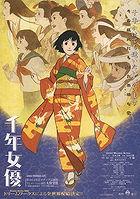
Posted : 17 years, 5 months ago on 2 January 2008 10:12
(A review of
Millennium Actress)
/Major spoilers alert!/ I haven't seen any anime film for a while, not since "Spirited Away" a couple of years ago, and even "Spirited Away" was the creation of Hayao Miyazaki, whose style I've become quite familiar with since the days of "Nausicaä" and "Totoro." In fact, the only Japanese anime movies I was exposed to was those of Ghibli Studio, so I didn't know what to expect from "Millennium Actress".
Well, it blew me away.
The graphic style of the movie is unique, and so is the storytelling. The seemingly simple premise has the heroine Chiyoko, the dream-eyed girl who becomes an actress, taking on a journey to find her love, the anti-government activist/painter whom she met only once when she was a teenager (how hopelessly romantic can you get than that?). The search spans over many decades through her life and career as an actress. The film starts out with a in-hiding 90-year-old Chiyoko being tracked down and interviewed by a filmmaker and Chiyoko fan, Genya (whom we later find out has more connections with her than we're led to believe in the beginning), and so it begins the flashbacks and the elaborate style of storytelling. What is really interesting about the storytelling is its non-linearity and the incorporation of Chiyoko's films into reality. The movies of Chiyoko are the stories within the major story, and they connect the dots that would finally present a picture of the timeless themes of love, lost, chance and the chasing of life-long dreams.
This fragmented narrative style and intertwined storylines at first might seem confusing, but the movie actually flows seamlessly along like the falling of a leaf or the trickling of a stream. It is poetic, and it is sad and uplifting at the same time. The fact the movies within the movie are the fragments from the major genres of Japanese films (within a time span of roughly 1000 years) only enhances the sense of journeying through time (not to mention the homage to Japanese film industry...loved the Godzilla scene), and it is as if the audience are along the ride of Chiyoko's long and relentless chase that transcends time and space (literally). The journey through the past also brings out the nostalgia for a time when chaos and innocence co-exist, when simple dreams are not to be crushed under the weight of cynicism.
"Millennium Actress" is full of symbolic and literal imagery. Chiyoko's Key is (pardon the pun) the key to the story ("her memories to the past"). It takes Chiyoko to many places and fills her with wonder and longing. Sure, her obsession with the key and the man of her dreams would seem crazy in reality, like you would half expect her to call the key "my precious," but the love is so literal and so earnest that you can't help rooting for her. Time is also symbolized by the creepy old lady with the wool spinner who haunts Chiyoko throughout the movie. She turns out to be the symbolic image of the aged Chiyoko who mourns the loss of her dreams and her youth. Unlike in the movies where time can be framed and stand still and an actress can be young forever, in reality, Chiyoko cannot escape the wheel of time. For me, it seems like the movie is giving tribute to the youthful energy and innocence that usually attribute to one's ability to dream, stubbornly.
"Millennium Actress" is a movie about love and the pursuit of love, but it can also be about the pursuit of happiness, perfection, dreams or whatever that drives human beings forward on this journey we call life. However, the movie best sums up what really signifies the journey and our relentless search for its meanings when the dying Chiyoko says to Genya that maybe it doesn't matter if she ever finds the man she loves because after all "it is the chase that [she] really loves;" in the end, it is this fervent love for life that is the key to living.

0 comments,
Reply to this entry
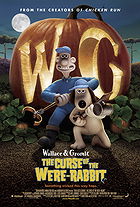
Posted : 17 years, 5 months ago on 2 January 2008 10:05
(A review of
Wallace & Gromit: The Curse of the Were-Rabbit)
No time for a detailed review, but this film was a pleasant surprise for me since I went into the theatre with no prior knowledge or experience of Wallace & Gromit on TV or in any other form and therefore not really knowing what to expect. It turned out to be a very entertaining and funny film. The claymation looks good, and the humour reminds me of Shrek in that the jokes rely a lot on tongue-in-cheek puns and parodies. The humour is definitely very British though, so not everyone will like it. I thought the movie was hilarious myself. Yes, the jokes are very silly, but in a good and witty sort of way. Kids would love the movie for the bouncy bunnies, but adults with a weird sense of humour would enjoy it as well.

0 comments,
Reply to this entry
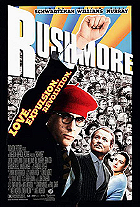
Posted : 17 years, 5 months ago on 2 January 2008 08:01
(A review of
Rushmore)
I liked this film as much as
[Link removed - login to see], which was also directed and written by
[Link removed - login to see] (co-written with
[Link removed - login to see]). Some people might not appreciate the quirkiness of his films, but I enjoy Anderson (and to the same extend Wilson's) dark sense of humour and his skewed yet strangely appealing and profound view of life. As in The Royal Tenenbaums, the characters in this film are quirky, interesting and somewhat disturbed; they're obsessive, disillusioned and sometimes downright unlikable. However, they're also human and capable of growth.
Anderson & Wilson brought to life the idealistic & obsessive teenager Max Fischer (
[Link removed - login to see]) and his middle-aged counterpart Herman Blume (
[Link removed - login to see]). These two characters form a strange bond through their connection to Rushmore. In a way, Blume's disillusion about life fits in nicely with Max's delusion of it. They're both children in different ways. Max cares and does too much (the classic overachiever) while Blume doesn't care enough or does just barely enough.
In the movie, the three main characters, Max, Herman & Rosemary (
[Link removed - login to see]) are all obsessed about something. They're bogged down in their own dramas. It reminds me of my favourite quote from Adaptation:
There are too many ideas and too many people. And too many directions to go. I was starting to believe that the reason it matters to care passionately about something, is that is whittles the world down to a more manageable size. - Susan Orlean
Underneath the quirkiness and the insanity of their actions, the characters are plagued with uncertainties and a feeling of losing control over their lives. What I like about the movie is how subtle the motivations behind the actions of the characters are. Anderson never tries to make his movies angsty for angsty's sake. In real life, people don't act like Shakespearean characters who always tell you how they feel and why they act the way they do. Our actions speak who we are. Sure, Anderson's characters are somewhat exaggerated, but they feel human. In Anderson's world, life is comically grotesque and often bitter-sweet, but always hopeful. Such is the charm of life and Rushmore.

0 comments,
Reply to this entry
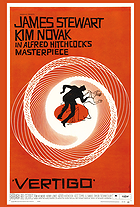
Posted : 17 years, 5 months ago on 2 January 2008 07:55
(A review of
Vertigo)
The movie opens with the main character Detective John 'Scottie' Ferguson (James Steward) almost falling from a building while chasing a criminal. This traumatic experience causes Scottie to have a fear of heights that results in dizziness, or vertigo. The premise of the film plays on the idea of vertigo as Scottie’s fear of heights makes him unable to work on the field as a policeman, and consequently, he becomes the ideal candidate in Gavin Elster’s sinister plot.
In typical Hitchcock fashion, the story is full of deception, suspense, mystery and psychological tension. The movie, like many other Hitchcock films, explores scopophilia and the notion of guilt. As the story unfolds, one gets the sense that something is not quite right in the whole scenario, and no one seems quite as innocent as he or she first appears to be. In Vertical, Hitchcock fully utilizes the San Francisco landscape as he shoots most of the movie on location. As Scottie stalks and spies on Madeleine Elster (Kim Novak), the audience is taken on a tour around San Francisco of the 50’s. The various locations where the movie takes place are quite memorable, and they give a sense of immediacy and realism to the story. In terms of the camera work, Hitchcock uses long shots to capture the landscape and close-ups to accentuate the psychological tension of the characters. The dream sequence where a confused and half-mad Scottie’s head twirls in a spiraling circle is certainly one of the most memorable scenes in all Hitchcock films.

0 comments,
Reply to this entry
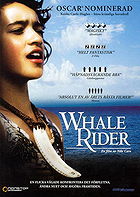
Posted : 17 years, 5 months ago on 2 January 2008 07:49
(A review of
Whale Rider)
First of all, let me make it clear that this is not another "Free Willy" movie, as my boyfriend suggested it when we rented it. Yes, there are whales and people saving whales, sort of, but it is a movie more about people, a specific group of people: the Maoris. Set in New Zealand and the coastal village of Whangara, "Whale Rider" centers around a declining Maori tribe and the hopes of its tribe leader for a savior in the form of his new-born grandson (whom was "foreseen" by him as someone who would lead the people and turn the tribe around). The grandson, however, died in childbirth with his mother, leaving behind a twin sister and a grieving father. The girl is given the name of Pai by the father, after the legendary Paikea, the tribe's founding ancestor who, according to the legend, arrived in the village on a whale's back. The story thus follows the thirteen-year-old Pai, who grew up in the loving care of her grandparents despite the disappointment of her grandfather (at the death of her twin brother). As Pai puts it, he "changed his mind" about this little girl who survived but whom seems to him has no use to the tribe's future. However, she has some use to him after all for he loves his grandchild dearly. The relationship between Pai and her grandfather is the focus of the movie, so is the obsession of the grandfather/tribe leader to find someone who could lead his people. When his son comes back to visit from Europe, this obsession rekindles in his stubborn heart and he sets out to find this mythical "leader" among the boys in the village through training and teaching them the traditions of Maori warriors. Feeling excluded and hurt by her grandfather's dismissal, Pai determines to learn those traditions, which includes stick fighting, against her grandfather's wish.
"Whale Rider" is a movie as much about going against the grain as it is about loyalty and love. While it seems at first that the tribe's survival conflicts with a grandfather's love for his grandchild, in the end, it is the embracing of that love that brings hope to the tribe and connects its people. Although the movie is full of mythical symbolism, it never loses its touch with reality. Pai's desire to prove herself comes more from her love for the grandfather than from the belief that she is the real leader (although she is). There is no feminist preaching despite the fact that Pai is a girl trying to prove herself in a boys' world. Her motivation is simple: she wants her grandfather back. One also gets the sense that the grandfather does not discriminate because of gender but because of tradition when he dismisses the most talented boy in his training camp because he's broken the rules. In this movie, the conflicts are real and the love is deep, but its seriousness is cleverly balanced by its humour and charm. The problems of the Maori people are always there in the background, and the movie does a good job of portraying the Maori culture and values without glorifying or diminishing them. In a way, Pai's love for her grandfather can be extended to signify the Maori people's love for their culture, and like Pai who follows her heart and her destiny, the tribe's survival lies in its people's hearts to continue its culture and tradition.

0 comments,
Reply to this entry
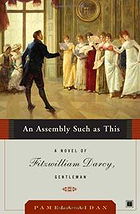
Posted : 17 years, 5 months ago on 31 December 2007 08:31
(A review of
An Assembly Such as This)
Being an ardent Jane Austen fan, I'm usually apprehensive about reading any 'sequels' or spin-offs of her novels. The overwhelming positive reviews of this book on Amazon, however, led me to give it a try. Well, I tried. I wanted to like it, but the book turned out to be so dull that I finally gave up after struggling 2/3 through the story. It started out promising, as the author endeavors to present
Pride and Prejudice from Fitswilliam Darcy's perspective, piecing together the clues left in the original to form her picture of Austen's most celebrated leading man. Pamela Aidan made an admirable effort to write in the voice of Austen, or at least in the voice of an 18th-century writer. While she does succeed, for the most part, in making the characters sound right, her writing itself is flat and Harlequin-romancy. In fact, as I read on, I couldn't get rid of the feeling that I was reading a book of well-crafted fanfiction (imagine my amusement when I later found out that it was indeed first written as fanfiction). Like most fanfic writers, Aidan often falls into the trap of using excessive purple prose, especially in describing Darcy's
feelings (and he has lots of them) towards Elizabeth. As Mr. Darcy falls head over heel in love with the heroine, the writing quickly falls apart. The reader is treated to numerous descriptions such as this:
... Elizabeth turned, waving them off with a wistful smile. As she did, Darcy finally saw her complete. The sight utterly ravished him. It was, suddenly, painful to breathe. The roaring of the blood through his veins caused the world about him to go silent.
Besides the melodramatic writing, I find the story generally dull and the excessive details of Darcy's horses, dogs and clothes tedious. I guess the author needs to fill up the pages as she intends to drag the story into a three-volume saga (as if the first one wasn't drawn out long enough). It's also hard to believe that a grown man like Darcy would think and act like a teenage girl as he obsesses over every moment with Elizabeth and daydreams about her and her "beautiful dark eyes." Even though I do find some original characters interesting, the whole novel is quite tiresome. I couldn't bring myself to finish it, as much as I tried. In the end, I just couldn't be bothered. If I wanted to read fanfiction, I wouldn't have bought one.

0 comments,
Reply to this entry
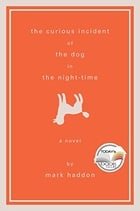
Posted : 17 years, 5 months ago on 30 December 2007 03:52
(A review of
The Curious Incident of the Dog in the Night-Time (Today Show Book Club #13))
Finished this book in record speed. Besides the fact that it is a rather easy read, The Curious Incident of the Dog in the Night-Time has a fascinating premise: an autistic boy trying to solve the mysterious murder of his neighbor's dog. The story is entirely told from this boy's perspective, and the readers get a glimpse into the unusual mind of an autistic teenager while he tells his story. The mystery surrounding the death of the dog turns out to be the leading clue to the main mystery in the book.
The book's title is a famous Sherlock Homes quote from Silver Blaze in which a baffled Watson (as he usually is) asked Holmes: "Is there any other point to which you would draw my attention?" To which Holmes responded: "To the curious incident of the dog in the night-time." "But the dog did nothing in the night-time," said a even more perplexed Watson (as he usually gets). "Ah!" replied Holmes, "That was the curious incident."
One can draw many similarities between Silver Blade and this book, but the mystery in The Curious Incident is essentially Christopher, the autistic teenager whose mind seems mysterious to most people unfamiliar with the disease. The author's portrayal of the working of an autistic mind seems authentic and convincing (although I know little about autism), and it is fascinating how the main character copes with the chaotic world using math and science as he doesn't understand metaphors or anything abstract, only concrete facts.
Overall, I enjoyed the book quite a bit, especially the fun factoids, and there were touching moments here and there. Although I got kind of tired of the repetitive descriptions of Christopher's autistic behaviour near the end, I still found the book fascinating in its own way. The frustrations of both the autistic person and those around him are conveyed vividly through Christopher's eyes. The book is not sentimental or clichéd, and pity is not called for. It is simply a book about understanding.

0 comments,
Reply to this entry
 Login
Login
 Home
Home 20 Lists
20 Lists 63 Reviews
63 Reviews Collections
Collections
 0 comments,
0 comments, 







